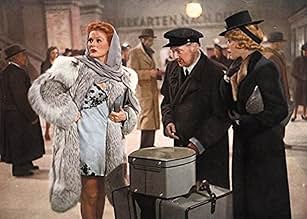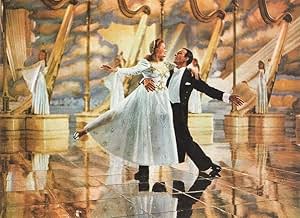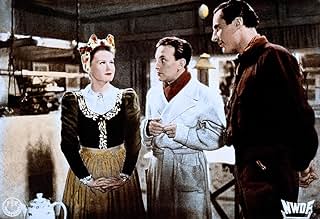A revue star escapes her exhausting theatre life. By train she travels to the mountains. Alone in the wilderness and dressed only in her fur coat, she is rescued by two engineers.A revue star escapes her exhausting theatre life. By train she travels to the mountains. Alone in the wilderness and dressed only in her fur coat, she is rescued by two engineers.A revue star escapes her exhausting theatre life. By train she travels to the mountains. Alone in the wilderness and dressed only in her fur coat, she is rescued by two engineers.
- Awards
- 1 win
Victor Janson
- Lokalgast
- (as Viktor Janson)
- Director
- Writers
- All cast & crew
- Production, box office & more at IMDbPro
Storyline
Did you know
- TriviaDuring filming Marika Rökk noticed that she is pregnant. According to her autobiography she had many snack attacks and pregnancy sickness. She wrote: "During the 9 months I had to puke daily and felt crashed. ... My eyes got small red veins - a catastrophe in a color film. ... Infact in 'The Woman of my Dreams' I wasn't a 'Dream woman' anymore. But what to do: I played one." Her daughter Gabriele Jacoby was born on the 13th April 1944 and became an actress herself later. Any necessary post-filming were only done after April 1944.
- Quotes
Julia Koestner: I'm not an angel. And I am not a devil either, as you thought yesterday. I am simply a woman.
- Crazy creditsThe word "End" is visible on the umbrella that is covering Peter and Julia,
- ConnectionsFeatured in Seventeen Moments of Spring: Shestaya seriya (1973)
- SoundtracksMach Dir nichts daraus
Performed by Marika Roekk
Featured review
This was sort of a last hurrah for big-budget Nazi cinema, as unsurprisingly the failing war effort was draining resources for such frivolities. But it makes a big effort to provide a booster shot of escapism to audiences who were no doubt in desperate need of it by then. This is basically a German equivalent to a Betty Grable movie--a gaudy color extravaganza with a silly romantic comedy plot and some pretty lavish production numbers, plus of course excuses for the star to run around half-dressed. (Though that's still more dressed than Grable would have been.) Of course, the Hollywood version would be brassy, while this is more kitschy, with an operetta-ish rather than Broadway feel. (The popular female star Marika Romm indeed performed in many stage operettas after the war.)
The plot, involving a runaway stage star taken in by two mountain-tunnel engineers who become rivals for her love, is nothing special, with no great chemistry between the competent leads and routine comedy relief from supporting actors. What is worth looking at are the big numbers, which are well-sung and produced. But they're not really INTERESTING, in terms of ideas or choreography or anything else. It's weird to see some "novelty" bits incorporating "exotic" foreign music and costume motifs, given the Nazis' extreme notions of racial/cultural superiority. (For the same reason, it's also a little strange that none of the leading characters are blond.)
Anyway, this is a curio fascinating in historical terms, but no great find as entertainment--for all the high production polish on display, the material is innocuous and its execution lacks much personality. I'm sure it did take Germans' minds off the war for a couple hours. But it can't hold a candle to the better Hollywood screen musicals of the same era.
The plot, involving a runaway stage star taken in by two mountain-tunnel engineers who become rivals for her love, is nothing special, with no great chemistry between the competent leads and routine comedy relief from supporting actors. What is worth looking at are the big numbers, which are well-sung and produced. But they're not really INTERESTING, in terms of ideas or choreography or anything else. It's weird to see some "novelty" bits incorporating "exotic" foreign music and costume motifs, given the Nazis' extreme notions of racial/cultural superiority. (For the same reason, it's also a little strange that none of the leading characters are blond.)
Anyway, this is a curio fascinating in historical terms, but no great find as entertainment--for all the high production polish on display, the material is innocuous and its execution lacks much personality. I'm sure it did take Germans' minds off the war for a couple hours. But it can't hold a candle to the better Hollywood screen musicals of the same era.
Details
- Release date
- Country of origin
- Language
- Also known as
- Žena mojih snova
- Production company
- See more company credits at IMDbPro
Box office
- Gross worldwide
- $864
- Runtime1 hour 33 minutes
- Sound mix
- Aspect ratio
- 1.37 : 1
Contribute to this page
Suggest an edit or add missing content

Top Gap
By what name was Die Frau meiner Träume (1944) officially released in Canada in English?
Answer






















